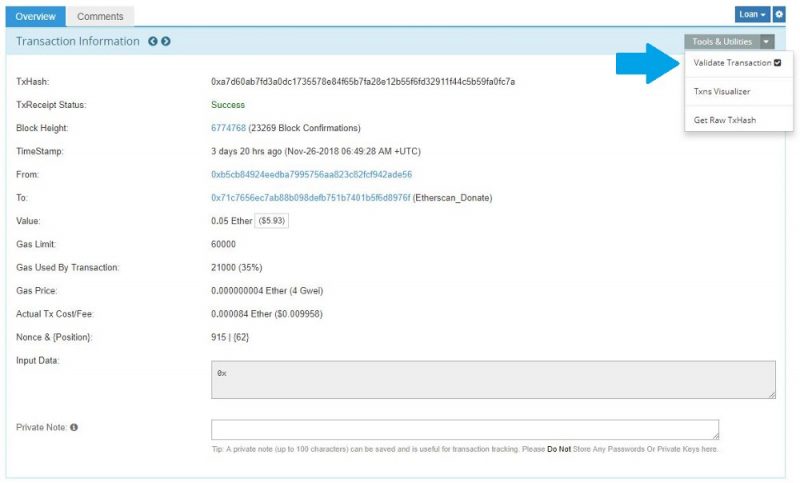Infura, MyCrypto, and MyEtherWallet partner to allow an extra layer of security by introducing verified transactions for Etherscan users.
What Is EthValidate?
The development of the Ethereum platform is moving ahead at full steam despite the drop in ETH price. Successive features are being developed to improve and turn the platform into a more accessible and efficient platform.
In a December 3, 2018, Medium post, Kaven Choi of Etherscan introduced a new feature, EthValidate, which is designed to enable users to validate any transaction, address, and token balance on the Etherscan’s node with other nodes across the blockchain.
EthValidate is an open-sourced feature that enables anyone to verify and validate transactions on Etherscan using MyEtherWallet, MyCrypto, and Infura. Ethvalidate can be downloaded and run locally. Apart from authenticating transactions, EthValidate also enables any user to validate addresses and check token balances.
Etherscan
Etherscan is not a wallet service provider, so it doesn’t store user’s private keys and doesn’t have any control over the transactions that take place over the Ethereum network. Etherscan is the leading block explorer for the number two blockchain that was developed and is maintained by a team of enthusiasts. Etherscan is not funded, operated or managed by the Ethereum Foundation but instead exists as an independent entity.
A block explorer is a search engine that allows anyone to quickly check, confirm, and validate transactions taking place on a blockchain.
Etherscan also can audit any of the tokens created on the Ethereum network. The related block explorer is operated and developed independently by a team of experts focused on decentralized information and infrastructure applications.
The Ethereum blockchain has a public ledger which Etherscan.io indexes and then makes available through its site. Etherscan’s mission is to simplify and improve blockchain transparency by indexing and allowing all transactions to be found on the Ethereum blockchain in the most transparent and accessible way.
How to Use EthValidate
Etherescan opted to introduce the new EthValidate feature to improve and add an extra layer of security to users making transactions using the most popular Ethereum wallets in the industry.
When on Etherscan, users will be able to validate any transaction simply by clicking on “Tools & Utilities > Validate Transaction.” Once this option is selected, a new page will pop up showing the transaction hash (txhash), status, and information related to the transaction from another Ethereum node.

(Source: Medium)
The public nodes used to provide this operation are provided as a courtesy of MyCrypto, MyEtherWallet, and Infura.
Node providers wanting to point to their node can easily create an issue on Github and provide the Etherscan team with the node URL. Additionally, EthValidate also enables a set of robust API Services which can be used to build decentralized applications (dApps) or to provide data feeds for the Ethereum blockchain.







